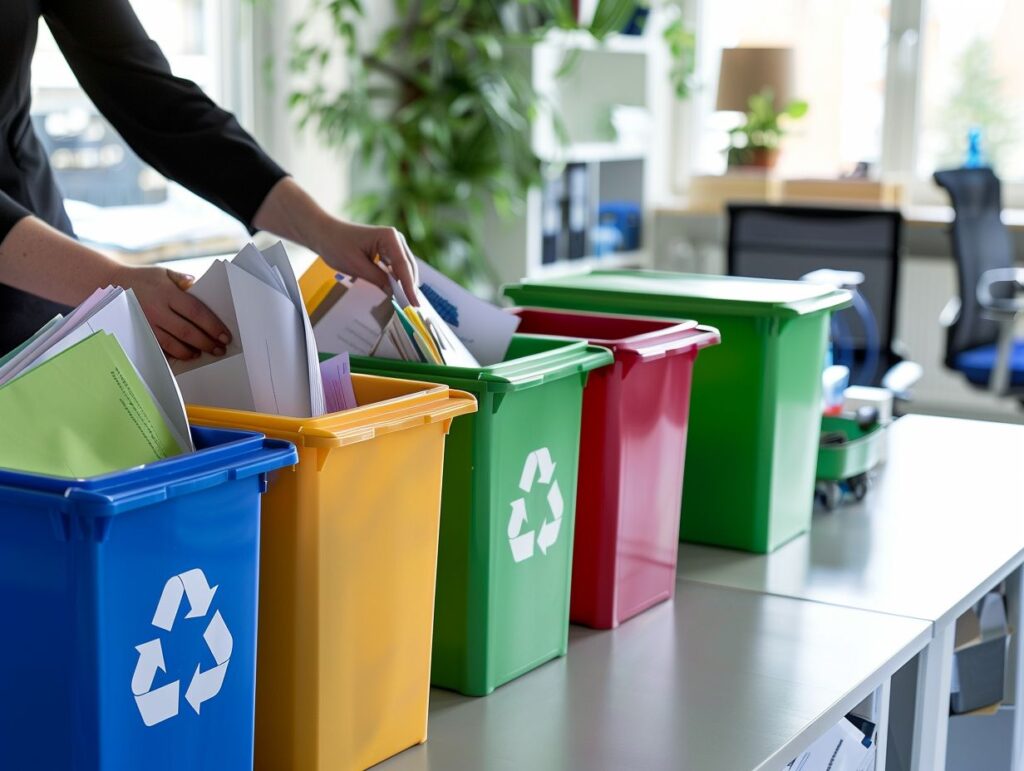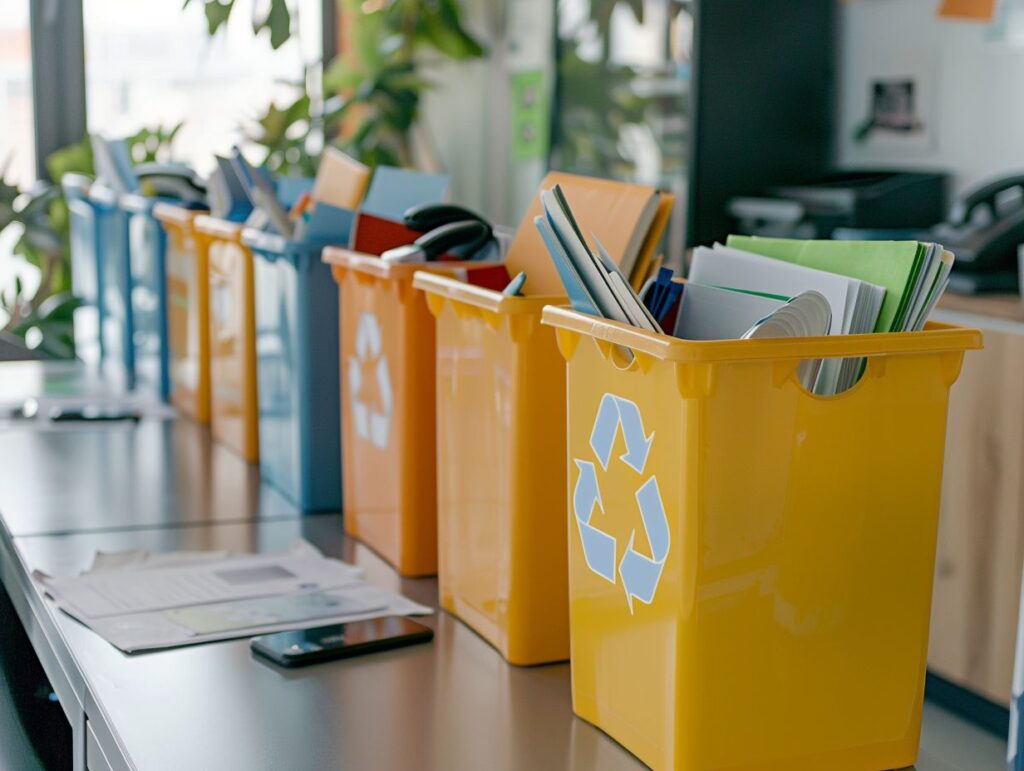Effective waste management in the office is increasingly vital as businesses prioritize sustainability and environmental responsibility. Today, we will explain the complexities of assessing your office’s waste stream, which encompasses the identification of various types of waste and the implementation of best practices for recycling.
We outline crucial guidelines for adequately disposing of hazardous and electronic waste, present strategies for reducing overall waste, and emphasise the significance of fostering a collaborative approach among colleagues. You can create a cleaner, greener workplace by engaging with these practices.

Why Proper Waste Management Matters
Proper waste management is essential for reducing the environmental impact of office waste and enhancing sustainability and corporate responsibility. As organisations increasingly adopt eco-friendly practices, you must understand and implement effective waste management strategies.
By adopting comprehensive waste disposal practices, your business can significantly minimise its environmental footprint, improve recycling effectiveness, and engage in resource recovery, promoting a greener workplace. This commitment to responsible waste handling and reduction aligns with community expectations and complies with environmental regulations, helping foster a culture of sustainability within your organisation.
Assessing Your Office’s Waste Stream
Assessing your office’s waste stream is crucial in implementing effective waste management solutions that can significantly enhance waste reduction practices and improve recycling initiatives. By conducting a thorough waste audit, you can identify the types and quantities of waste generated in your office—such as paper, plastic, and electronic waste—enabling you to develop targeted recycling programmes and waste segregation strategies.
This assessment not only aids in tracking waste but also informs your waste management policies, fostering employee engagement in eco-friendly practices and promoting a sustainable office culture.
Identifying Types of Waste
Identifying the types of waste generated in your office is crucial for developing effective waste management strategies and ensuring responsible disposal practices. Common categories of office waste include recyclable materials such as paper and plastic, hazardous waste like batteries and chemicals, and e-waste, which consists of outdated electronics that require careful handling.
By understanding these waste types, you can implement effective waste segregation techniques, ensuring that compostable waste is properly diverted while maximising participation in recycling programmes.
In addition to these categories, offices often generate industrial waste from equipment maintenance and organic waste from employee lunches and snacks. By categorizing these different forms of waste, your organisation can significantly improve recycling rates.
For instance, clearly labelled bins for paper, plastic, and organic waste can facilitate effective material separation. Educating employees about the importance of proper disposal and providing training sessions on waste management practices are essential for fostering an environmentally responsible workplace.
This approach not only enhances recycling effectiveness but also promotes a culture of sustainability among staff members.
Best Practices for Recycling in the Office
Implementing best practices for recycling in the office is essential for fostering a culture of sustainability and promoting responsible waste management among employees.
Establishing clear recycling programmes and placing designated recycling bins throughout the office encourage participation and ensure that recyclable materials are effectively collected and processed.
Educating staff on recycling guidelines and common mistakes to avoid will enhance engagement in these initiatives, leading to improved waste diversion and a significant reduction in landfill disposal.
Setting Up a Recycling Programme
Setting up a recycling programme in your office requires careful planning and active employee involvement to ensure its success and alignment with waste management goals. Start by establishing clear recycling guidelines that define which materials can be recycled and provide training sessions to educate employees on the programme’s objectives and the significance of recycling awareness. By fostering a sense of responsibility and ownership among your staff, you can enhance participation and create an environment where recycling becomes a standard practice.
To launch this initiative effectively, it is crucial to select appropriate recycling bins that are clearly labelled and easily accessible to all employees. Consider strategically placing these bins in high-traffic areas to encourage usage. Partnerships with local recycling centres will ensure the materials are processed responsibly and efficiently.
You can further enhance employee involvement through regular meetings to discuss progress and share success stories, such as organising a monthly recycling competition or implementing recognition programmes for those who contribute significantly to the effort. Remember, an informed team is more likely to be engaged, so continuous education and updates on the programme will help sustain motivation over time.

Common Recycling Mistakes to Avoid
Avoiding common recycling mistakes is crucial for the effectiveness of your office’s recycling initiatives and overall waste management efforts. Many organisations struggle with improper sorting and contamination of recyclable materials, leading to increased waste disposal costs and reduced recycling rates.
Comprehensive recycling education and employee training will help mitigate these issues, ensuring everyone understands the recycling guidelines and follows the correct waste disposal methods.
To reinforce these efforts, implementing regular workshops and updates on recycling policies will keep sustainability at the forefront of daily operations. Creating a culture of responsibility is essential, where each individual feels accountable for their recycling habits.
Visual aids, such as clear signage indicating what can and cannot be recycled, serve as valuable reminders. Frequent audits of recycling bins help identify persistent mistakes and allow for targeted improvements.
By fostering an environment of continuous learning and collaboration, your organisation can significantly enhance its recycling practices and contribute positively to the environment.
Proper Disposal of Hazardous and Electronic Waste
Proper disposal of hazardous and electronic waste is a critical aspect of responsible waste management that prevents environmental contamination and ensures compliance with regulations.
You must recognise that hazardous waste, including chemicals and certain office supplies, requires specialised disposal methods to ensure safe treatment. Similarly, e-waste, which encompasses old electronics and batteries, demands careful handling and adherence to local disposal practices to mitigate environmental risks and promote sustainable waste management.
Guidelines and Regulations
Understanding the guidelines and regulations for hazardous waste and e-waste disposal is essential for ensuring compliance in waste management and adopting responsible disposal practices. These regulations detail the proper handling, transportation, and disposal methods for hazardous materials, allowing businesses to avoid legal penalties while protecting the environment.
Suppose your office aims to implement eco-friendly practices and reduce its environmental impact. In that case, you must familiarise yourself with local and national waste management regulations.
Organisations must remain informed about the latest regulations and best practices to ensure compliance, as these regulations frequently change. Numerous resources, such as the Environment Agency and local waste management authorities, offer valuable information and support to assist businesses in meeting compliance standards.
Neglecting these regulations can result in significant fines, legal repercussions, and damage to your organisation’s reputation. Effective waste management is a legal obligation and a fundamental aspect of corporate responsibility, demonstrating your organisation’s commitment to sustainable practices and community well-being.
Reducing Office Waste
Reducing office waste is a fundamental goal for organisations that enhance sustainability and minimise environmental impact.
Implementing effective waste reduction strategies—such as adopting a paperless office, engaging in composting programmes, and promoting zero—waste initiatives—can significantly decrease the volume of waste generated.
This proactive approach supports environmental stewardship and fosters a culture of sustainability within your organisation, encouraging employees to embrace eco-friendly practices.
Strategies for Waste Reduction
Effective waste reduction strategies are essential for creating a sustainable office environment and minimising one’s overall waste footprint. Best practices include utilising sustainable materials, optimising waste prevention techniques, and enhancing employee training regarding recycling programmes.
Organisations can significantly decrease excess waste by fostering a proactive approach to waste reduction while promoting a culture of responsibility among staff.
This approach benefits the environment and helps reduce operational costs over time. For instance, by switching to digital documentation, your organisation can limit paper usage and encourage employees to bring reusable meal containers, thereby reducing single-use plastics.
Engaging team members through workshops and informative sessions can raise awareness about what can be recycled and how proper disposal methods work, ensuring everyone understands their crucial role in the process. Such initiatives create a more environmentally conscious workplace, prioritising sustainability through collective effort.
Collaborating with Colleagues for Effective Waste Management
Collaborating with colleagues for effective waste management is essential for fostering a sense of accountability and enhancing corporate responsibility within your office.
Engaging employees in waste management training and recycling education initiatives empowers them to take ownership of their impact and encourages a collective approach to eco-friendly practices.
Promoting teamwork in waste reduction efforts can cultivate a sustainable office culture that values responsible waste practices and environmental stewardship.
Encouraging Participation and Accountability
Encouraging participation and accountability among employees is crucial for the success of your office’s waste management solutions and recycling programmes. By fostering a sense of ownership and responsibility, you can motivate your staff to actively engage in waste reduction efforts and adhere to recycling guidelines.
Regular training sessions and recognition programmes for employees who contribute effectively to waste management initiatives can enhance motivation and reinforce the importance of individual actions.
To nurture this culture further, it is vital to establish clear roles within these initiatives, allowing individuals to understand their contributions to the overall goal. Incentive programmes, such as rewards for teams that achieve recycling milestones, can foster friendly competition and teamwork.
Continuous communication about these practices’ impact helps maintain engagement and cultivates a shared commitment to sustainability.
When employees recognise the tangible benefits of their efforts, their dedication to eco-friendly practices will strengthen, reflecting a collective responsibility towards a greener workplace.